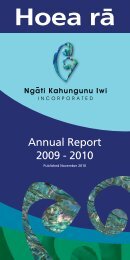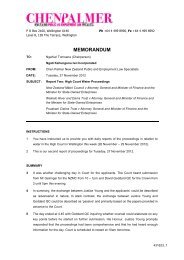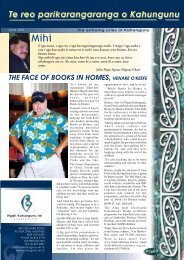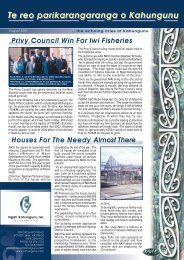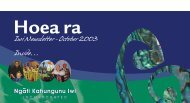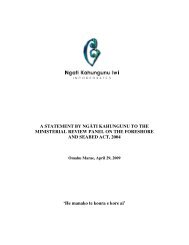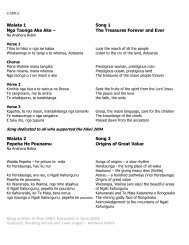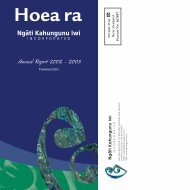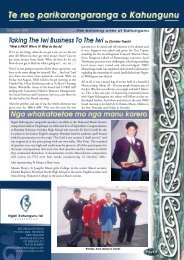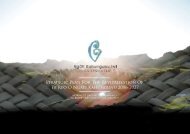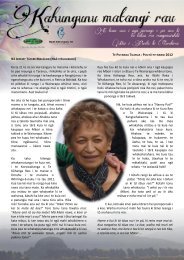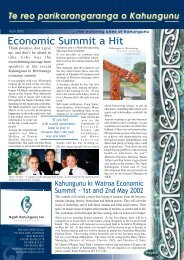A PRIMER ON CONSTITUTIONAL TRANSFORMATION - Converge
A PRIMER ON CONSTITUTIONAL TRANSFORMATION - Converge
A PRIMER ON CONSTITUTIONAL TRANSFORMATION - Converge
You also want an ePaper? Increase the reach of your titles
YUMPU automatically turns print PDFs into web optimized ePapers that Google loves.
THE WORKING GROUP FOR C<strong>ON</strong>STITUTI<strong>ON</strong>ALTRANSFORMATI<strong>ON</strong>.<strong>PRIMER</strong> NUMBER <strong>ON</strong>E.“Are we surviving or perishing through the operations of Parliament in these yearsthat are passing…”- Report of the Committee of Kahungunu, 1872.“Ehara taku mana i te mana hōuHe mana tawhito tonu taku mana…”- “Te Waiata mo Ruatāhuna”.
INTRODUCTI<strong>ON</strong>.The independent Constitutional Transformation Working Group – Matike MaiAotearoa - was established at a national hui that was held at HopuHopu in 2009.It consists of members nominated by Iwi and Hapū and other organisations such asthe National Urban Māori Authority. It also includes people chosen for their particularexpertise in tikanga and constitutional matters.Its Terms of Reference are –“To work on developing a model for a constitution for our country based on ourtikanga and fundamental values, He Whakaputanga o te Rangatiratanga o Niu Tireni(the 1835 Declaration of Independence) and Te Tiriti o Waitangi”.The Working Group first met in late 2010 and has spent the time since thenundertaking research and developing its work programme.Beginning in late April it will begin a series of hui throughout the country to meet anddiscuss constitutional change.The hui are being organised in the following regions (with some times overlapping)April/May: Kahungunu.May: Te Tai Tokerau.June: Tamaki Makaurau.July: Te Tau Ihu/Ngai Tahu.August/September: Mataatua, Te Tai Rawhiti.September: Te Arawa.October: Taranaki/Whanganui/Ratana.November: Rangitane/Muaupoko/Raukawa/Ngati Toa/ Whanganui-a-Tara.December: Tainui/Waikato/Hauraki.Early 2013: National Hui.This Primer is the first part of an information-sharing programme that the WorkingGroup will produce. It raises a number of questions that are often asked aboutconstitutional issues and explains the reasons why such discussion is needed now.Later Primer will cover other issues that we hope will inform the debate and be ofhelp to those who attend our hui.We also hope that as broad a cross-section of people as possible will attend the huiand participate in the discussions. Haere mai, nau mai.Moana Jackson,Working Group Convenor.Margaret Mutu.Working Group Chair.
Some Preliminary Questions:What is a constitution?A constitution is the values and institutions that people choose to govern themselves.What sorts of constitutions are there?The most common are the constitutions that people develop whenever they form agroup of some kind such as a sports club or marae committee.Throughout history the most important have been those that a society as a wholedevelops so that it can govern itself collectively as a polity or nation.Why have societies developed constitutions?There are two main reasons.Firstly, every society has realised that they can only maintain harmony and order ifthere are ideas and institutions to ensure that people can live peacefully together.Secondly constitutions develop as a way of ensuring that the society can be politicallyindependent and make its own decisions free of interference from others.Are all constitutions the same then?No.Every constitution is unique to the people and culture who developed it.How are they different?Usually in the values people have about how and why they should govern themselves.For example in Bolivia the prime law of their new constitution is the protection ofPachamama or the Earth Mother whereas many other older constitutions were builtaround values such as protecting property or the divine right of kings.Do all these constitutions have any things in common at all?Yes.Firstly, every constitution is based around what may be called a concept of power oran idea about what constitutional authority is.Secondly, every constitution also includes a site of power, that is the place orinstitution where the people actually make their governing decisions.Thirdly, every society has declared that its constitutional power to make independentdecisions was so important it could never be voluntarily ceded or given away.
For example nowhere in European history is there any evidence that say Britain evervoluntarily ceded, gave away or subordinated its authority to another polity.What are these concepts and sites of power called?Because they are also unique to the people and culture who developed them everysociety has defined them in their own way.For example the Havasupai define their concept of power as “sumaaga” while inHawaii people used the word “mana” which means an absolute independent authority.In Europe the most common term for a concept of power was “sovereignty”.The sites of power have different names too. For example in Britain it is Parliament,in the USA it is the Congress.Did Iwi and Hapū have constitutions before 1840?Yes.Like every other society Iwi and Hapū knew that harmony and order could only bemaintained if there were values and institutions that helped people live together.Did Iwi and Hapū have a concept and site of power?Yes.For centuries the concept of power was called “mana,” although some Iwi and Hapūused the terms “mana taketake” or “mana motuhake” to define the absolute andindependent authority to govern.The site of power in each Iwi and Hapū was the institution of the rangatira, hence thelater use of the term “rangatiratanga” to describe the absolute authority to govern.Were they similar in any way to other concepts and sites of power?Only in the sense that Iwi and Hapū also knew that constitutional power could neverbe voluntarily ceded or given away.For example nowhere is there any evidence that say Ngāti Kahungunu ever ceded,gave away or subordinated its constitutional authority to another Iwi or Hapū.Were there particular ways that Iwi and Hapū constitutions were unique?Yes.They developed out of history, tikanga and whakapapa to preserve the ability of eachIwi and Hapū to make its own independent decisions while preserving theinterrelationships people had with each other.
In that sense they were like the kawa of the marae where Iwi and Hapū stillindependently govern affairs on the marae while forging interrelationships withvisitors, except that before 1840 the “marae” was the whole country.They were also like kawa because the fact that one marae would never subordinate itskawa to another reinforced the broader inalienable nature of mana and rangatiratanga.When did this constitutional situation change?The Crown believes it changed in 1840 when it says that Iwi and Hapū did agree togive away and subordinate their existing constitutional authority to its sovereignty.Even though that claim was contrary to all human history (as well as our tikanga) itthen established the constitutional system that it had brought from England.So why has the Working Group been established?There are a number of reasons.Ever since people started coming here from somewhere else Iwi and Hapū have triedto find a constitutional arrangement that preserved their independence while seekingsome sort of formal interrelationship with the Crown.He Whakaputanga was perhaps the first such attempt. Te Tiriti o Waitangi wasanother, especially as Iwi and Hapū understood that it guaranteed their ongoingindependence while allowing a new formal interrelationship with the Crown.Many other debates have taken place since then, including a series of national huicalled by Sir Hepi Te Heuheu in 1995 and 1996.What does the Working Group hope to do?The Working Group hopes to continue that debate, which is why its Terms ofReference seek a constitutional dialogue based on a different set of values as well ason tikanga, He Whakaputanga and Te Tiriti o Waitangi.It hopes to initiate steps towards a different constitution that comes from this landand allows a proper place (a formal interrelationship) with everyone who lives here.Is further information available?Yes.More Primers and meeting schedules will be distributed and published on the Group’sFacebook Page: The Independent Constitutional Working Group – Aotearoa MatikeMai and the web page: http//www.converge.org.nz/pma/iwi.htmIf anyone would like particular information or to meet with members of the WorkingGroup please contact the Project Manager at Catherinedavis@hotmail.co.nz



